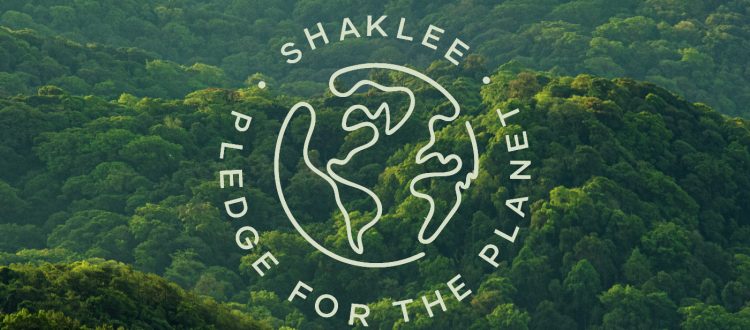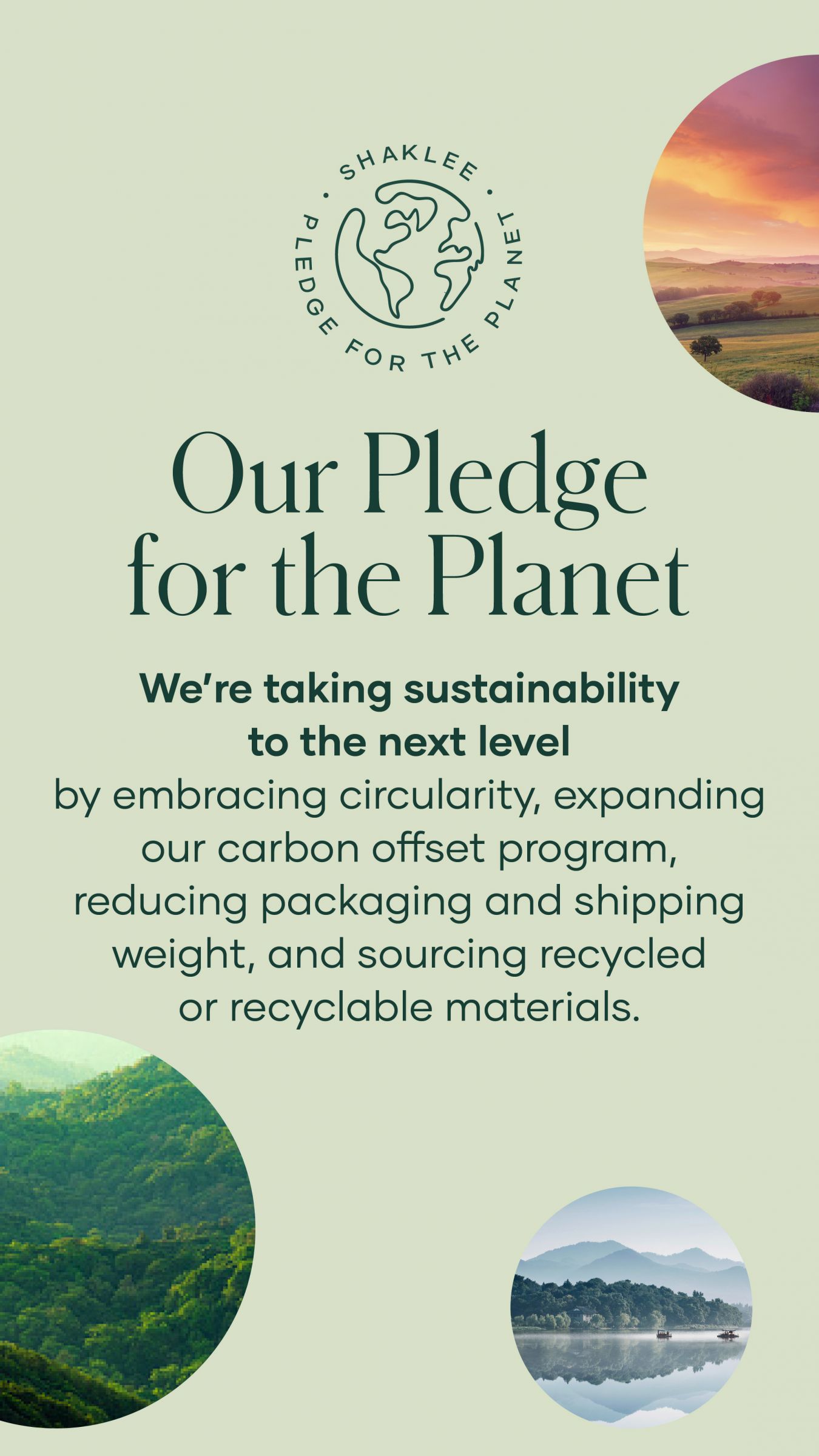Shaklee Pledge for the Planet
In honor of Earth Day, Shaklee is making a new Pledge for the Planet!
Our Pledge for the Planet
Embrace Circularity + Reduce Impact
We’re taking sustainability to the next level by embracing circularity, expanding our carbon offset program, reducing packaging and shipping weight, and sourcing recycled or recyclable materials.
We Pledge That By 2025
- Sustainable Packaging: 100% of all packaging and shipping material will be recyclable, reusable, refillable, compostable, or made with PCR materials.
- Beyond Carbon Neutral: Our Climate Neutral™ initiative will cover all scope 3 carbon emissions, including those produced by our suppliers, shipping partners, employees, and more.
This Year
- Replacing plastic canisters with sustainable bags to help
- Reduce packaging weight by an estimated 70%
- Save an estimated 220,500 lbs. of packing materials from landfills
- Keep an estimated 627 truckloads off the road
- Introducing reusable solutions to minimize plastic, which will help
- Eliminate an estimated 66% of plastic scoops from use in our powdered products
And Beyond
We believe the planet deserves to be protected. We’re committed to environmental stewardship and will continue to find ways to improve our earth-friendly practices, reduce our impact, and create a healthier world for us all.
Learn More About Shaklee’s Sustainability Journey:
For More than 60 Years, Shaklee has led the way in environmental stewardship and support of social causes. Shaklee’s commitment to sustainability is in keeping with its founding philosophy of Living in Harmony with Nature®.
- 1956 Forrest C. Shaklee founded a company based on Living in Harmony with Nature® that is committed to developing products to improve the health of people and the planet.
- 1960s Shaklee introduces Basic-H® Concentrated Organic Cleaner, one of the first nontoxic, biodegradable cleaners.
- 1970s Shaklee introduces one of the first biodegradable laundry detergents without phosphates, nitrates, or borates.
- 1985 Shaklee was selected by the Wild Dolphin Project to provide environmentally friendly cleaning products for use onboard their research vessel, Stenella. The Wild Dolphin Project is dedicated to studying the habitat of dolphins and Shaklee’s relationship with them has continued for 21 years.
- 1986 Shaklee provided financial support and products for the first recorded, unsupported expedition by dog sled to the North Pole, led by National Geographic award-winning polar explorer, author, and educator Will Steger.
- 1987 Shaklee was selected by Jacques Cousteau and the Cousteau Society to provide environmentally friendly cleaning products for use onboard their research vessels, the Calypso and Alcyone.
- 1989 Shaklee helped build schools and health clinics and planted more than one million trees in Asia through a partnership with the American Himalayan Foundation, an organization chaired by Sir Edmund Hillary.
- 1989-90 Shaklee provided financial and product support for a trans-Antarctica expedition led by Will Steger, which was the first crossing of Antarctica on foot, covering 3,700 miles. Following this expedition, Steger testified before Congress on polar and environmental issues and co-founded the Center for Environmental Education.
- 1990 Shaklee’s nontoxic and biodegradable Basic-H® was chosen as one of the first official Earth Day products.
- 1991 Shaklee introduces Basic-D®, one of the first phosphate-free automatic dishwashing detergents.
- 1992 Shaklee Cares®, a nonprofit organization, was established and dedicated to providing relief from natural disasters such as tornadoes and hurricanes, whose severity has been compounded by climate change.
- 1995 Shaklee provided financial and product support for the third International Arctic Project led by Will Steger. This was the first surface crossing of the 2,500-mile-wide Arctic Ocean. The expedition brought information about environmental issues and changes to the polar landscape to millions of school children worldwide.
- 1996 Shaklee environmentally friendly cleaning products were selected by Ocean Alliance and the Whale Conservation Institute to be used onboard the Odyssey, a research vessel that gathers data on contaminants throughout the world’s oceans. This relationship continues today.
- 1998 Shaklee becomes a Charter Partner of the U.S. EPA’s Climate Wise Program, which set aggressive corporate-wide greenhouse gas reduction goals.
- 2000 Shaklee becomes the first company in the world to obtain Climate Neutral™ certification and totally offset its CO2 emissions.
- 2000 Shaklee opens its World Headquarters, one of the first green, energy-saving, award-winning buildings designed using sustainable materials, including certified sustainable wood, recycled carpets, and recycled plastics. In 2001, Shaklee received the Savings by Design Energy Efficiency Integration Award by the American Institute of Architects.
- 2005 Shaklee becomes a major partner of the Green Belt Movement, founded by Dr. Wangari Maathai, the 2004 Nobel Peace Prize laureate.
- 2006 Wangari Maathai becomes the Global Ambassador for A Million Trees. A Million Dreams™, a Shaklee environmental campaign that raises awareness of global climate change and initiates efforts to plant trees in North America and Africa.
- 2006 Shaklee holds a first-ever carbon neutral conference in San Francisco by offsetting the greenhouse gas emissions from the Company’s 50th Anniversary Conference, attended by some 10,000 participants.
- 2006 Shaklee is selected as a U.S. EPA Climate Leader, pledging to maintain a net zero impact on climate change and offset 100% of its greenhouse gas emissions through 2009.
- 2006 Shaklee is commended by President Bill Clinton for leadership in offsetting carbon emissions by creating renewable energy in Africa and is recognized at the Clinton Global Initiative.
- 2007 Shaklee becomes a founding member of the Business Council on Climate Change, an organization of businesses that serves as an inspiration and model of global climate stewardship by implementing effective and economically sound solutions to climate change.
- 2007 Shaklee provides financial and product support for polar explorer Will Steger and his GlobalWarming101.com expedition. This brand-new expedition includes an extensive educational outreach campaign to students throughout America to raise awareness of the impact of global climate change on five Inuit communities in the Arctic.
- 2007 Shaklee is the first consumer products company to offset 100% of its CO2 emissions through the EPA Climate Leader’s program and use 100% green power.
- 2007 Shaklee is selected by the nation’s leading child advocacy group, Healthy Child Healthy World, to be the exclusive partner for a new video titled “Creating Healthy Environments for Children.”
- 2007 Shaklee is selected by the producers of THE 11th HOUR, a feature-length documentary narrated by Leonardo DiCaprio, as a partner due to its exemplary track record for environmental leadership.
- 2007 Shaklee partnered with Dr. Jeffrey Sachs and The Earth Institute at Columbia University to facilitate direct emissions reductions through the installation of solar-powered LED lanterns in Malawi. This installation project replaces inefficient and unhealthy kerosene wick lamps and provides an improved and sustainable source of reading and task lighting for villagers in Malawi.
- 2008 Shaklee was named to the Top 20 Retail Partner list by the EPA Green Power Partnership in recognition of being a top purchaser of green power.
- 2008 Shaklee was honored with a Stevie Award at the Sixth Annual American Business Awards for Best Corporate Environmental Responsibility Program.
- 2009 Shaklee was honored with a Clean Air Award by Breathe California in recognition of Shaklee’s leadership in reducing global warming and improving air quality.
In addition to climate neutral efforts, Shaklee’s quality program includes comprehensive testing of raw materials and finished products for quality and purity, with components that are significant to sustainability. Shaklee includes certification from suppliers that all food ingredients are non-GMO (genetically modified organism). In addition, the company goes beyond the supplier certification of testing the raw materials and will have finished products tested to confirm that they do not contain GMOs.
- Committed to Plant 10 million trees in 10 years
- For every Get Clean® Starter Kit sold, we plant 1 tree in North America with our partnership with American Forests™. That’s 75,700+ trees—and counting.
- All our corrugate shipper boxes are 100% recyclable. Consult your local recycling service on how to go about doing this (i.e., drop off centers, pick-up service, etc.).
- All our packaging material (shipper box, air pillows or paper void-fill, dividers, poly bags, and packing slips/invoices) is recyclable.
- Less Landfills. More Refills: Our super-concentrated formulas + recyclable or reduce waste packaging prevent 23 million pounds of packaging waste & 54 million pounds of greenhouse gas emissions.*
- Our Basic H2® has helped keep 22.2+ Billion Plastic Bottles from Landfills**.
Sustainability at Our Warehouse
- A recycling program within our GP facility addresses production waste (shrink-wrap, cut up corrugate, etc.), and the waste generated by personnel (i.e., soda cans, water bottles, printer paper, etc.). We partner with a local company that purchases those materials from us after we’ve compacted and baled them.
- We provide each of our employees with a reusable plate and bowl to minimize the use of plastic or paper ware and water bottles to minimize the use of bottled water.
- We also sell our used wooden pallets to third parties who sell them off to be reused at other companies.
Sustainability in Sourcing:
- Vivix®: Our flagship product features muscadine grapes. Pomace is the material typically discarded after making wine or pressing grape for fruit juice. The pomace material is the predominant source for the muscadine extract used in Vivix. Typically the muscadine pomace is just tilled back into the soil and/or the seeds are isolated and dried/milled for livestock.
- Meology™: Our pack dispenser is made with sustainable packaging materials made in wind-powered facilities. Individual packs are recyclable too.


